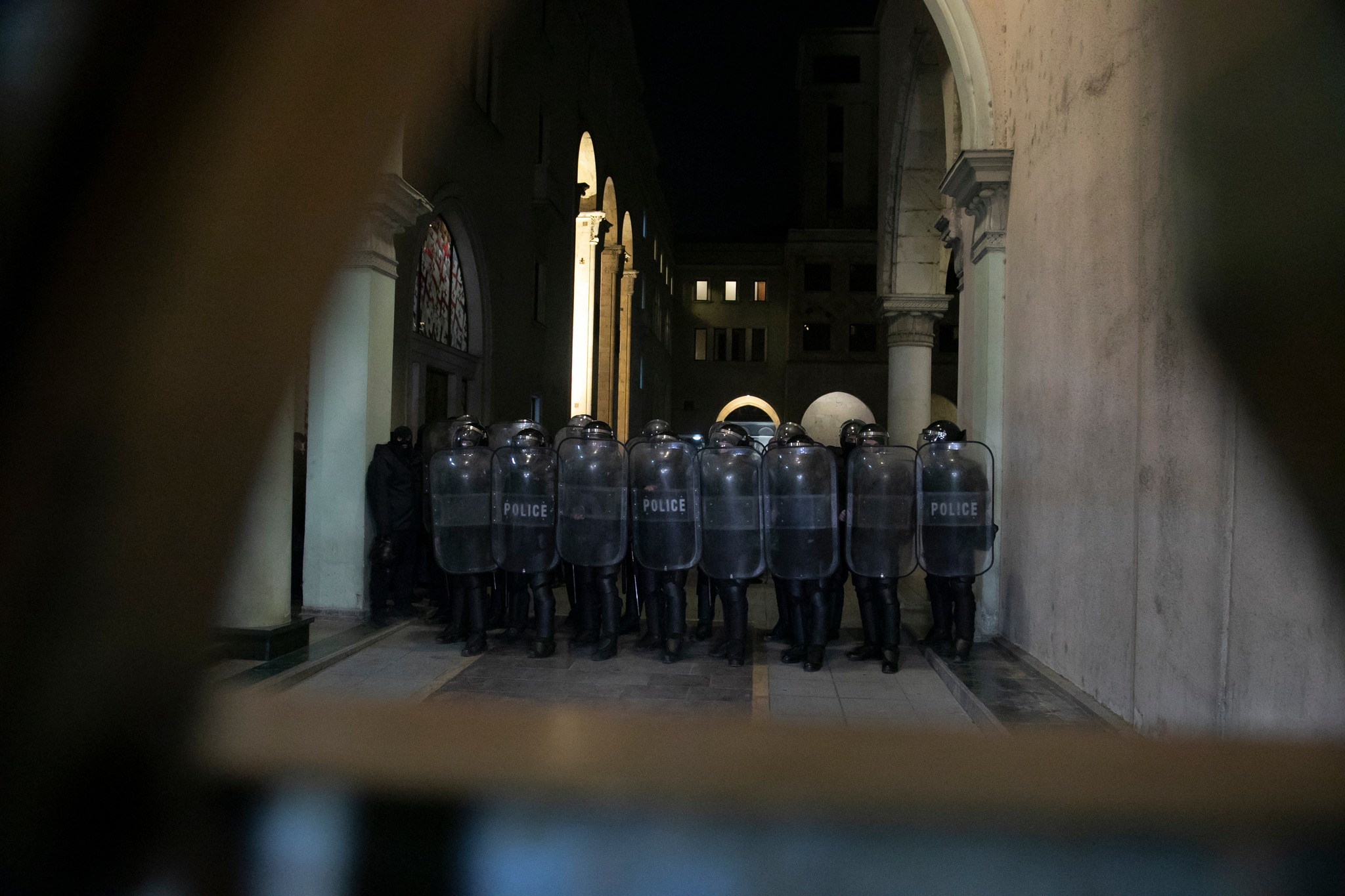HRC: Police violated international standards during 7-9 March rallies, creating risk of harm to people
The Human Rights Center published a report on the use of special means by the police during March 7-9 demonstrations where citizens protested the draft bills “On Transparency of Foreign Influence” and “On Registration of Foreign Agents”, initiated by members of the parliamentary majority.
The HRC monitors who observed the rally on March 7-9 assessed it as peaceful. At around 20:00, on March 7 the Parliament adopted the bill “On Transparency of Foreign Influence” in the first reading. By that time, the number of participants in the rally had exceeded 10,000. Riot police blocked the entrances to the Parliament and prevented demonstrators from moving through the streets. At 20:20, without warning, the police used pepper spray and water cannons to disperse the rally participants on Chichinadze Street.
During the March 7-9 rallies, the warning of the use of special means was announced only after the fact – when the participants had no time to disperse. According to HRC observers, the police used special means (pepper spray and water cannons) during the rallies without taking into account the principle of necessity. In one case, a police officer was seen spraying pepper spray directly into the eyes of a demonstrator. In addition, footage circulated by the media showed the police mixing pepper spray with water cannon, which violates international standards and creates a risk of intentional harm to people.
According to the Law of Georgia on Police “water cannons, armored car, and other special transportation means are used to suppress mass violations of the legal order, to repel a group attack on the state and/or public facilities, to stop a vehicle by force if the driver does not obey a police officer’s demand to stop; to detain an armed criminal”. The report notes that none of the above grounds were found during the protests. Thus, the police used a water cannon without any legal basis to disperse the participants of a peaceful assembly.
According to international standards, pepper spray may not be used at a distance of less than one meter (optimum distance is 1.25 to 2 meters), as well as against the rally participant who is not behaving aggressively. Indiscriminate use of force by the police against anyone can lead to an escalation of the conflict, as was the case during the March protests.
HRC stresses that during the rallies on March 7-9, the actions of some participants exceeded the scope of the right to peaceful assembly and demonstration. However, according to the OSCE Guidelines, even if inappropriate behavior or isolated instances of violence by one or more participants in the demonstration are observed at the rally, a peaceful demonstration does not automatically acquire the character of a violent assembly, which in turn would be considered a legal basis for restricting the freedom of assembly. Indiscriminate use of force by the police against anyone can lead to an escalation of the conflict, as was the case during the protests.
HRC recommends:
To the Special Investigation Service:
● ensure timely, comprehensive, and impartial investigation of cases related to possible
abuse of authority by law enforcement officers.
To the Office of the General Prosecutor of Georgia:
● thoroughly investigate the legality of the order regarding the use of special means as
well as the scope of the use of such means.
To the Ministry of Internal Affairs:
● respect the freedom of assembly enshrined in the Constitution of Georgia and not to
interfere unjustifiably in the protected scope of this right;
● before using special means, in accordance with the requirements of the legislation of
Georgia, the authorized representatives of the Ministry of Internal Affairs shall issue a
preliminary warning and give the participants of the rally a reasonable time to comply and
disperse;
● ensure the use of special means in accordance with the principle of proportional force,
only in cases of extreme necessity;
● follow the requirements of the national legislation and international standards when
dispersing public assemblies through the use of special means;
● train the employees of the Ministry regarding the use of special means and to ensure
that such means are used in accordance with the guidelines approved by the Minister of
Internal Affairs.
Also Read:
- 31/10/2023 – GYLA Report: Evaluating the March 7-9 Civil Protest – Legality, Proportionality and Human Rights Violations
- 09/03/2023 – UPDATE: 134 Arrested in March 7-9 Rallies Against Foreign Agents Law
This post is also available in: ქართული Русский
